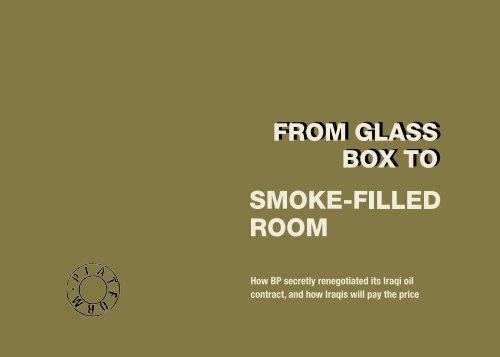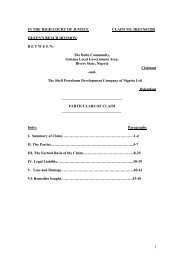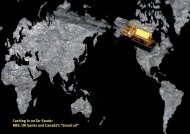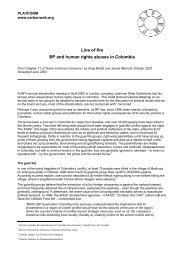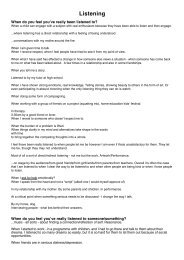new report - Fuel on the Fire
new report - Fuel on the Fire
new report - Fuel on the Fire
- No tags were found...
You also want an ePaper? Increase the reach of your titles
YUMPU automatically turns print PDFs into web optimized ePapers that Google loves.
SUMMARYDuring <strong>the</strong> sec<strong>on</strong>d half of 2009, Iraq held two aucti<strong>on</strong>sof its largest oilfields, awarding <strong>the</strong>m to multinati<strong>on</strong>alcompanies such as BP, Shell and Exx<strong>on</strong>Mobil to operateunder 20-year c<strong>on</strong>tracts. Between <strong>the</strong>m <strong>the</strong> oilfieldsaccount for over 60% of Iraq’s reserves. The c<strong>on</strong>tractswere service c<strong>on</strong>tracts ra<strong>the</strong>r than <strong>the</strong> companies’preferred producti<strong>on</strong> sharing agreements, which had beenproposed for Iraq but rejected as giving too much away.The first c<strong>on</strong>tract awarded, for <strong>the</strong> Rumaila field insou<strong>the</strong>rn Iraq, was privately renegotiated between <strong>the</strong>Iraqi government and <strong>the</strong> winning BP/CNPC c<strong>on</strong>sortiumfor more than three m<strong>on</strong>ths after <strong>the</strong> aucti<strong>on</strong>. PLATFORMhas obtained <strong>the</strong> renegotiated Rumaila c<strong>on</strong>tract, and canreveal its c<strong>on</strong>tents for <strong>the</strong> first time. We find that <strong>the</strong> termschanged significantly from <strong>the</strong> published model c<strong>on</strong>tract <strong>on</strong>which <strong>the</strong> aucti<strong>on</strong> was based.Media <str<strong>on</strong>g>report</str<strong>on</strong>g>s of <strong>the</strong> aucti<strong>on</strong> focused <strong>on</strong> <strong>the</strong> headlineremunerati<strong>on</strong> fees. These sounded so low – between$1.15 and $5.50 per barrel – that many commentatorsquesti<strong>on</strong>ed <strong>the</strong> profitability of <strong>the</strong> deals. But as always inoil c<strong>on</strong>tracts, <strong>the</strong> devil is in <strong>the</strong> detail. And whereas <strong>the</strong>aucti<strong>on</strong>s were billed by <strong>the</strong> Iraqi government as am<strong>on</strong>g<strong>the</strong> world’s most transparent c<strong>on</strong>tracting processes, thisbriefing reveals what subsequently happened behindclosed doors to make <strong>the</strong> c<strong>on</strong>tracts much more attractiveto <strong>the</strong> multinati<strong>on</strong>al companies, at <strong>the</strong> expense of <strong>the</strong>Iraqi people.
The most important changes are:1. If Iraqi oil producti<strong>on</strong> is restrained by a future OPECquota, <strong>the</strong> Iraqi government would pay BP/CNPCas much for not producing oil as <strong>the</strong>y would forproducing it. Under <strong>the</strong> model c<strong>on</strong>tract, <strong>the</strong> cost ofcomplying with any quota had been shared betweengovernment and company.2. If Iraq’s transport and export infrastructure is notexpanded sufficiently in time for producti<strong>on</strong>, <strong>the</strong>Iraqi government would again pay BP/CNPC for notproducing oil. Again, <strong>the</strong> model c<strong>on</strong>tract had shared<strong>the</strong>se risks between <strong>the</strong> two sides.4. If a natural disaster, industrial acti<strong>on</strong>, war or terroristincident (‘force majeure’) prevented oil producti<strong>on</strong> formore than 90 days, <strong>the</strong> Iraqi government wouldcompensate BP/CNPC for <strong>the</strong>ir lost income, ra<strong>the</strong>rthan <strong>the</strong> costs being shared as in <strong>the</strong> model c<strong>on</strong>tract.5. BP/CNPC are not held liable for any geologicaldamage to Iraq’s oil reservoirs as a result of producingoil too quickly or inefficiently.3. The threshold for requiring <strong>the</strong> Iraqi South OilCompany’s (SOC’s) approval of expenditures – vital toprevent corrupti<strong>on</strong> and cost-inflati<strong>on</strong> for <strong>the</strong> purpose oftax avoidance – is increased from $50 milli<strong>on</strong> to $100milli<strong>on</strong>; SOC’s ability to reject or challenge expendituresis restricted; and its approval is automatically assumedafter 45 days.
The effect of <strong>the</strong>se changes is to transfer <strong>the</strong> mostsignificant risks from BP/CNPC to <strong>the</strong> Iraqi government,making <strong>the</strong> c<strong>on</strong>tracts c<strong>on</strong>siderably more attractive to <strong>the</strong>companies. In all of <strong>the</strong>se changes, it is <strong>the</strong> Iraqi sidethat loses out. As a result of <strong>the</strong> enhanced compensati<strong>on</strong>provisi<strong>on</strong>s, <strong>the</strong> Iraqi government could find itself payingBP/CNPC (and likely o<strong>the</strong>r companies) even when it is notearning oil revenues to offset those payments. Meanwhile,<strong>the</strong> changes undermine <strong>the</strong> Iraqi ability to ensure that itachieves value for m<strong>on</strong>ey, and that oil is developed in <strong>the</strong>nati<strong>on</strong>al interest.The Iraqi government is now c<strong>on</strong>sidering asking <strong>the</strong> oilcompanies that signed c<strong>on</strong>tracts during <strong>the</strong> two aucti<strong>on</strong>sto renegotiate, so as to reduce <strong>the</strong>ir combined producti<strong>on</strong>target from 12 milli<strong>on</strong> to 6-7 milli<strong>on</strong> barrels per day, as <strong>the</strong>higher original target would crash <strong>the</strong> oil price and overloadIraqi infrastructure. But since <strong>the</strong> secret changes to BP’sc<strong>on</strong>tract, <strong>the</strong> Iraqi government is obliged to pay oilcompanies as if <strong>the</strong>y were producing at <strong>the</strong> higher rate,whe<strong>the</strong>r or not <strong>the</strong>y actually do. The companies <strong>the</strong>reforehave no incentive to reduce <strong>the</strong>ir targets, unless significantc<strong>on</strong>cessi<strong>on</strong>s are offered in return. As <strong>the</strong> governmentbelatedly realises its 2009 mistakes, <strong>the</strong> BP renegotiati<strong>on</strong>leaves it little opti<strong>on</strong> o<strong>the</strong>r than to offer more m<strong>on</strong>ey.The aucti<strong>on</strong> however was based <strong>on</strong> a model c<strong>on</strong>tractthat specified very different terms. If <strong>the</strong> final terms hadbeen known in <strong>the</strong> aucti<strong>on</strong>, companies might have madelower bids and <strong>the</strong> result could have been quite different.The process cannot <strong>the</strong>refore be seen as havingbeen meaningfully transparent. It appears that <strong>the</strong> OilMinistry belatedly posted a generalised versi<strong>on</strong> of <strong>the</strong>revised c<strong>on</strong>tract <strong>on</strong> its website in April 2010, with noannouncement or explanati<strong>on</strong>. It has still not published <strong>the</strong>specific c<strong>on</strong>tracts for Rumaila or any o<strong>the</strong>r fields, despiteits promises to do so. Iraqis are left not knowing which is<strong>the</strong> final versi<strong>on</strong>, nor what changed or why. There is now anurgent need, both for <strong>the</strong> sake of public accountability andto help prevent abuse, for <strong>the</strong> Iraqi government to publish<strong>the</strong> final versi<strong>on</strong>s – as signed – of all of <strong>the</strong> c<strong>on</strong>tracts ithas awarded.
Oil workers at <strong>the</strong> Rumaila field.
In <strong>the</strong> mean time, bidders <strong>on</strong> two of <strong>the</strong> o<strong>the</strong>r sou<strong>the</strong>rnfields held a series of discussi<strong>on</strong>s with <strong>the</strong> Oil Ministry: anExx<strong>on</strong>Mobil/Shell c<strong>on</strong>sortium for <strong>the</strong> West Qurna Phase 1project, and an Eni-led c<strong>on</strong>sortium for Zubair. In October,those companies announced that <strong>the</strong>y had decided toaccept <strong>the</strong> Iraqi Oil Ministry’s maximum remunerati<strong>on</strong> feesof $1.90 for West Qurna 1 and $2 for Zubair, compared toinitial bids of $4 and $4.80 respectively.A sec<strong>on</strong>d licensing round was held in December 2009,in which seven c<strong>on</strong>tracts were awarded. Finally, in March2010, two Chinese companies accepted <strong>the</strong> Oil Ministry’sterms for a fourth first-round c<strong>on</strong>tract, for <strong>the</strong> Maysangroup of fields: this time <strong>the</strong> companies cut <strong>the</strong>ir bid by astaggering 90%, from $21.40 to $2.30.
WHAT CHANGED?While this sequence of events sounded strange, Iraqioil experts have since been asking what changed tomake <strong>the</strong> Exx<strong>on</strong>Mobil and Eni c<strong>on</strong>sortia accept <strong>the</strong> OilMinistry’s remunerati<strong>on</strong> fees, which <strong>the</strong>y previouslyc<strong>on</strong>sidered unec<strong>on</strong>omic. That is, what happened between<strong>the</strong> beginning of July and <strong>the</strong> middle of October 2009?The Ministry of Oil has insisted that no significant changeswere made. Shahristani said in October 2009 that <strong>the</strong> threem<strong>on</strong>ths of discussi<strong>on</strong>s had been <strong>on</strong>ly for a clarificati<strong>on</strong> <strong>on</strong><strong>the</strong> Iraqi tax regime, ra<strong>the</strong>r than a material change. “O<strong>the</strong>rthan that, <strong>the</strong>re has been no changes to <strong>the</strong> c<strong>on</strong>tract, andwe do not negotiate c<strong>on</strong>tracts. C<strong>on</strong>tracts are presented in<strong>the</strong> bid rounds. They are ei<strong>the</strong>r accepted or rejected.” 6The companies gave a different story. Rob Franklin,President of Exx<strong>on</strong>Mobil Upstream Ventures, commentedthat, “we’ve negotiated hard with <strong>the</strong> Iraqi governmentand <strong>the</strong> Ministry of Oil and we’ve come to an arrangementthat we’re happy with and <strong>the</strong>y’re happy with.” 7 AlessandroBernini, Chief Financial Officer of Eni, told financial analystsin a c<strong>on</strong>ference call that, “we accepted $2 because,basically, <strong>the</strong> fiscal terms are different now.” He addedthat <strong>the</strong> <str<strong>on</strong>g>new</str<strong>on</strong>g> terms with a remunerati<strong>on</strong> fee of $2 wereequivalent to <strong>the</strong> pre-bid terms at a fee of $4.50. 8PLATFORM can now answer this questi<strong>on</strong>. We haveobtained, from a source believed to be reliable, a versi<strong>on</strong>of <strong>the</strong> Rumaila c<strong>on</strong>tract with BP/CNPC dated 8 October2009. On that date, <strong>the</strong> c<strong>on</strong>tract was agreed and initiallysigned, and <strong>the</strong>n submitted to <strong>the</strong> Iraqi Cabinet for aproval,which was given <strong>on</strong> 16 October. Apart from any minorchanges requested by <strong>the</strong> Cabinet, we believe this to be<strong>the</strong> final versi<strong>on</strong> as signed. We compare it in this briefingwith <strong>the</strong> official model c<strong>on</strong>tract, dated 23 April 2009, whichformed <strong>the</strong> basis of <strong>the</strong> first bid round.In a competitive process, companies make <strong>the</strong>ir bids based<strong>on</strong> <strong>the</strong>ir evaluati<strong>on</strong> of <strong>the</strong> risks and rewards of <strong>the</strong> project<strong>on</strong> offer. The full set of c<strong>on</strong>tractual terms is important: if <strong>on</strong>eof <strong>the</strong> terms changes such as to decrease <strong>the</strong> risks inherentin <strong>the</strong> project, <strong>the</strong>n companies will re-assess <strong>the</strong> profits <strong>the</strong>yaccept, and submit corresp<strong>on</strong>dingly lower bids. Soimportant are some of <strong>the</strong> changes that had <strong>the</strong>y beenwritten into <strong>the</strong> model c<strong>on</strong>tract before <strong>the</strong> bidding tookplace, <strong>the</strong> result of <strong>the</strong> aucti<strong>on</strong> could have been verydifferent. As such, <strong>the</strong> claims that <strong>the</strong> process wastransparent are fatally flawed.
CHANGE 1 – Foreign companies compensated for OPEC quotasAT TIME OF AUCTION:The published model c<strong>on</strong>tract stated that in <strong>the</strong> event of agovernment-imposed curtailment of producti<strong>on</strong> (such asto comply with a future OPEC quota), <strong>the</strong> barrels notextracted during <strong>the</strong> period of curtailment could beextracted later. 9AFTER RENEGOTIATION:In c<strong>on</strong>trast, <strong>the</strong> renegotiated c<strong>on</strong>tract states that BP/CNPC awill be “fully compensated” by ei<strong>the</strong>r of those means or by“payment of lost income to C<strong>on</strong>tractor in respect of <strong>the</strong>estimated volumes not produced during <strong>the</strong> period for which<strong>the</strong> producti<strong>on</strong> levels are decreased.” 10 In o<strong>the</strong>r words, <strong>the</strong>Iraqi government could have to pay <strong>the</strong> foreign companyremunerati<strong>on</strong> fees for <strong>the</strong> barrels it does not produce, aswell as those it does. This could c<strong>on</strong>stitute a c<strong>on</strong>siderableexpenditure, given that <strong>the</strong> compensati<strong>on</strong> would (by definiti<strong>on</strong>)not be taken from oil revenues, but from o<strong>the</strong>r governmentbudgets. The costs of meeting quotas (from which both sidesbenefit) are no l<strong>on</strong>ger shared but placed entirely <strong>on</strong> <strong>the</strong> Iraqigovernment. For BP/CNPC, <strong>the</strong>ir revenues are guaranteedagainst <strong>the</strong> eventuality of OPEC quotas b , making <strong>the</strong>c<strong>on</strong>tract c<strong>on</strong>siderably more attractive.SIGNIFICANCE:One of <strong>the</strong> most criticised aspects of <strong>the</strong> licensing roundsis <strong>the</strong> impact <strong>the</strong>y will have <strong>on</strong> <strong>the</strong> global oil market.Between <strong>the</strong> two rounds, c<strong>on</strong>tracts were signed that wouldboost Iraq’s oil producti<strong>on</strong> from <strong>the</strong> current 2.5 milli<strong>on</strong>barrels per day (bpd) to around 12 milli<strong>on</strong> by 2017.Most oil experts believe that <strong>the</strong> market cannot absorb sogreat an increase. The likely impact of such a rate would bea collapse of <strong>the</strong> oil price: so that what Iraq gained in ratesof producti<strong>on</strong> it could lose in price per barrel. The net resultcould in fact be a decrease in Iraqi oil revenues.Some estimates suggest <strong>the</strong> market could absorb <strong>on</strong>lyaround 5.5 – 7 milli<strong>on</strong> bpd of Iraqi producti<strong>on</strong>, even if o<strong>the</strong>rOPEC producers did not increase producti<strong>on</strong> at all in faceof rising global demand. 11 Shahristani has said that Iraqneed not produce <strong>the</strong> full c<strong>on</strong>tracted amount, whichbetween 12 c<strong>on</strong>tracts with multinati<strong>on</strong>al companiesamounts to 12 milli<strong>on</strong> barrels per day – that will ra<strong>the</strong>r beits producti<strong>on</strong> capacity. But if it does not, it will have to payBP and CNPC.aIraq is not currently subject to an OPEC quota, because as a result of <strong>the</strong> sancti<strong>on</strong>s from 1990 to2003, and <strong>the</strong>n damage and instability following <strong>the</strong> 2003 invasi<strong>on</strong>, <strong>the</strong> country has not been able toproduce oil at a rate commensurate to its reserves. Iraq’s last quota traditi<strong>on</strong>ally matched Iran’s (around4 milli<strong>on</strong> bpd) – a higher quota might be expected to compensate for Iraq’s misfortunes, but it isunlikely to be more than, say, 6 milli<strong>on</strong> barrels per day.bTo be precise, ‘C<strong>on</strong>tractor’ refers to <strong>the</strong> c<strong>on</strong>sortium of BP and CNPC with <strong>the</strong>ir Iraqi partner, SOMO
CHANGE 2 – Infrastructure risks transferred to Iraqi sideAT TIME OF AUCTION:The published model c<strong>on</strong>tract c<strong>on</strong>tained provisi<strong>on</strong>s for<strong>the</strong> foreign companies to upgrade <strong>the</strong> pipelines and o<strong>the</strong>rinfrastructure as required, and to treat <strong>the</strong>ir costs of doingso as ‘supplementary costs’. 12 But <strong>the</strong> risk of <strong>the</strong> exportinfrastructure not being expanded sufficiently in time for <strong>the</strong>increase in oil producti<strong>on</strong> was shared between <strong>the</strong> Iraqi andforeign sides: both would lose revenues in that event.AFTER RENEGOTIATION:The renegotiated c<strong>on</strong>tract, in c<strong>on</strong>trast, provides that BP/CNPC would be compensated – by <strong>the</strong> same mechanismsas for OPEC quotas – if <strong>the</strong> Iraqi distributi<strong>on</strong> and exportinfrastructure is unable to receive <strong>the</strong> full produced amount,of ei<strong>the</strong>r oil or associated gas. 13 The previously shared riskand cost is now fully allocated to <strong>the</strong> Iraqi government.Again, <strong>the</strong> Iraqi government is likely to end up payingcompanies for oil that is not produced – payments thatmust <strong>the</strong>refore come from o<strong>the</strong>r public budgets.SIGNIFICANCE:Most analysts, 14 including some inside <strong>the</strong> Iraqigovernment, 15 believe that Iraq will be unable to meet <strong>the</strong>ambitious targeted rates of producti<strong>on</strong>. One of <strong>the</strong> biggestreas<strong>on</strong>s is that Iraqi infrastructure is struggling to copeeven with current rates of producti<strong>on</strong>. The pipelines to <strong>the</strong>sou<strong>the</strong>rn tanker terminals, for instance, were built in 1975with a 20-year shelf-life. No ‘pigging’ a has been d<strong>on</strong>e since1991, because <strong>the</strong> pipes could not take <strong>the</strong> pressure. 16C<strong>on</strong>structi<strong>on</strong> c<strong>on</strong>tracts have been awarded to increaseIraqi sou<strong>the</strong>rn export capacity by 2.4 milli<strong>on</strong> bpd, and <strong>the</strong>Oil Ministry plans to expand nor<strong>the</strong>rn export capacity viaTurkey by 1.1m bpd, and to build <str<strong>on</strong>g>new</str<strong>on</strong>g> pipelines throughSyria carrying 2.5m bpd. Even if all of <strong>the</strong>se ambitiousplans were achieved, <strong>the</strong>y would still fall well short of <strong>the</strong>10 milli<strong>on</strong> or more barrels per day of increased exports ifproducti<strong>on</strong> targets are met (allowing for somedomestic use).aCleaning and inspecting <strong>the</strong> pipes by sending a ‘pig’ (pipeline inspecti<strong>on</strong> gauge) al<strong>on</strong>g it.
CHANGE 3 – Less oversightAT TIME OF AUCTION:The model c<strong>on</strong>tract required Joint Management Committeeapproval of all project expenditures above $20 milli<strong>on</strong>, andSouth Oil Company (SOC) approval of all expenditures over$50 milli<strong>on</strong>. 17AFTER RENEGOTIATION:The renegotiated c<strong>on</strong>tract increased <strong>the</strong> threshold forSOC approval to $100 milli<strong>on</strong>, and fur<strong>the</strong>r qualified it byadding that approval “shall not to be unreas<strong>on</strong>ablywithheld” (thus increasing <strong>the</strong> evidential <strong>on</strong>us <strong>on</strong> SOC), andthat if no objecti<strong>on</strong> were made within 45 days, it would beassumed approved. 18 The Iraqi ability to ensure that <strong>the</strong>project is c<strong>on</strong>ducted in such a way as to meet Iraqi interests,and to obtain value for m<strong>on</strong>ey, is reduced. BP/CNPC Cc<strong>on</strong>versely gain an opportunity to illegitimately increase<strong>the</strong>ir benefits at <strong>the</strong> expense of Iraq.SIGNIFICANCE:It is normal in oilfield development c<strong>on</strong>tracts for <strong>the</strong> investorto require state approval of its expenditures. Such oversigh<strong>the</strong>lps prevent corrupti<strong>on</strong>, ensures that <strong>the</strong> project getsvalue-for-m<strong>on</strong>ey equipment and services (ra<strong>the</strong>r than, forinstance, purchasing from an affiliate company) and avoidstax avoidance through cost inflati<strong>on</strong>. In this case, <strong>the</strong> fiscalstructure is such that foreign companies will earn higherremunerati<strong>on</strong> fees if <strong>the</strong>ir costs are higher: so <strong>the</strong>re is anincentive for so-called ‘gold-plating.’ d Governmentapproval of expenditures is <strong>the</strong>refore important, to ensurethat <strong>the</strong> field is developed efficiently, effectively and at <strong>the</strong>lowest cost to <strong>the</strong> Iraqi state.There are already c<strong>on</strong>cerns about <strong>the</strong> capacity of Iraqiinstituti<strong>on</strong>s to regulate and oversee <strong>the</strong> project, especially asa result of <strong>the</strong> loss of expertise from <strong>the</strong> Iraqi oil industry since2003, and <strong>the</strong> fragmenting of its instituti<strong>on</strong>s. The time limit <strong>on</strong><strong>the</strong>ir approval or n<strong>on</strong>-approval may in this c<strong>on</strong>text createopportunity for tenders to be pushed through whilst <strong>the</strong> Iraqiside has insufficient time to study <strong>the</strong>m fully. For example,it is comm<strong>on</strong> in <strong>the</strong> oil industry for affiliate companies to beregistered in secretive tax havens, so time may be required toexamine <strong>the</strong> identity of suppliers and subc<strong>on</strong>tractors, as wellas <strong>the</strong> appropriate market prices for <strong>the</strong>ir goods and services.
CHANGE 4 – Security, political and natural risks transferred to Iraqi sideAT TIME OF AUCTION:The model c<strong>on</strong>tract specified that if oil operati<strong>on</strong>sare suspended for more than 90 days as a result of‘force majeure’ (an unforeseen event that prevents oilproducti<strong>on</strong>, such as a natural disaster, industrial acti<strong>on</strong>,war or act of terrorism), <strong>the</strong> term of <strong>the</strong> c<strong>on</strong>tract would beextended accordingly. 19 This meant sharing of <strong>the</strong> risks, bydelaying revenues for both sides, quite reas<strong>on</strong>ably as suchevents could not be c<strong>on</strong>sidered ei<strong>the</strong>r side’s fault. Therewas no specific provisi<strong>on</strong> <strong>on</strong> security.AFTER RENEGOTIATION:SIGNIFICANCE:Since <strong>the</strong> oilfields awarded in <strong>the</strong> two licensing roundsare known, <strong>the</strong> risks to foreign investors are all above <strong>the</strong>ground, especially political and security risks. In <strong>the</strong> caseof Iraq, <strong>the</strong>se risks are significant, because of <strong>the</strong> lack ofnati<strong>on</strong>al c<strong>on</strong>sensus (or c<strong>on</strong>sultati<strong>on</strong>) <strong>on</strong> <strong>the</strong> decisi<strong>on</strong> toaward development of <strong>the</strong> fields to foreign companies,because of <strong>the</strong> inherent instability of Iraq’s post-2003political instituti<strong>on</strong>s and because of <strong>on</strong>going security risksand physical threats. Meanwhile, BP/CNPC avoid liabilityfor any human rights abuses committed in defending<strong>the</strong>ir assets.The renegotiated c<strong>on</strong>tract added that in <strong>the</strong> event of a90-day force majeure suspensi<strong>on</strong>, BP/CNPC would alsobe compensated from Iraqi public budgets for <strong>the</strong>ir lostincome. If <strong>the</strong> two sides could not agree <strong>on</strong> <strong>the</strong> level ofcompensati<strong>on</strong>, it would be resolved by internati<strong>on</strong>alinvestment arbitrati<strong>on</strong>. 20 These risks – some of <strong>the</strong> mostsignificant facing <strong>the</strong> project – are thus transferred in fullto <strong>the</strong> Iraqi side.Fur<strong>the</strong>rmore, SOC is obliged to provide“adequate” security through <strong>the</strong> Iraqi armed forces, and tocarry liability for <strong>the</strong>ir acti<strong>on</strong>s and c<strong>on</strong>duct. BP/CNPC areentitled to hire private security if <strong>the</strong>y c<strong>on</strong>sider securityarrangements insufficient, and to charge <strong>the</strong> costs to <strong>the</strong>Iraqi state, as ‘petroleum costs’. 21
CHANGE 5 – Companies not liable for reservoir damageAT TIME OF AUCTION:The April 2009 model c<strong>on</strong>tract stated that <strong>the</strong> foreigncompanies would not be liable for c<strong>on</strong>sequential (indirect)damages. 22AFTER RENEGOTIATION:The October 2009 c<strong>on</strong>tract broadened <strong>the</strong> scope of <strong>the</strong>damages and losses for which BP/CNPC would not beliable, and specifically listed damage to Iraqi oil reservoirsand formati<strong>on</strong>s. 23 This change gives BP/CNPC anopportunity to maximise <strong>the</strong>ir own profits during <strong>the</strong> termof <strong>the</strong>ir c<strong>on</strong>tract, at <strong>the</strong> expense of damaging futureprospects for <strong>the</strong> field when managed by Iraqis.SIGNIFICANCE:Under <strong>the</strong> sancti<strong>on</strong>s from 1990 to 2003, under-investmentand lack of access to internati<strong>on</strong>al supplies and servicesled <strong>the</strong> Iraqi oil industry to produce oil from its fields in away that damaged <strong>the</strong>ir l<strong>on</strong>g-term geological integrity.Investment and careful reservoir management is requiredto optimise <strong>the</strong> producti<strong>on</strong> of oil over <strong>the</strong> whole life of afield. Super-giant fields such as Rumaila are expectedto produce oil for far l<strong>on</strong>ger than <strong>the</strong> 20-year durati<strong>on</strong> of<strong>the</strong> recently awarded c<strong>on</strong>tracts. However, it is in foreigncompanies’ interests to maximise <strong>the</strong>ir extracti<strong>on</strong> of oilduring <strong>the</strong> period of <strong>the</strong>ir c<strong>on</strong>tracts, even if that is at <strong>the</strong>expense of <strong>the</strong> l<strong>on</strong>ger-term potential of <strong>the</strong> fields: it wouldbe Iraq that lost out through later reduced output resultingfrom reservoir damage. Ir<strong>on</strong>ically, in 2004/5, BP and Shellwere hired by <strong>the</strong> Iraqi government precisely to find ways ofmanaging <strong>the</strong> reservoirs so as to end (and perhaps reverse)<strong>the</strong> geological damage caused during <strong>the</strong> Saddam era. 24aA higher expenditure (which is all reimbursed by <strong>the</strong> Iraqi side) will keep <strong>the</strong> R-factor down, and soprevent <strong>the</strong> remunerati<strong>on</strong> fee being adjusted downwards
May 2011 – attempts to renegotiate c<strong>on</strong>tractsIn early May 2011, <strong>the</strong> Oil Ministry appeared to acceptwhat most analysts had been saying for nearly 18 m<strong>on</strong>ths,that <strong>the</strong> high producti<strong>on</strong> targets set in <strong>the</strong> 11 oil c<strong>on</strong>tractsawarded in two aucti<strong>on</strong>s might be unachievable due toinfrastructure c<strong>on</strong>straints, and undesirable for <strong>the</strong>ir impact<strong>on</strong> <strong>the</strong> oil price. Ra<strong>the</strong>r than <strong>the</strong> c<strong>on</strong>tracted total of 12mbpd, Ministry officials, now under Minister Abdul-Karimal-Luaibi, suggested 6-7m bpd might be more realistic andproposed renegotiating <strong>the</strong> c<strong>on</strong>tracts to that effect. 25 Justdays later however, former Oil Minister Shahristani, nowDeputy Prime Minister for Energy, rejected suggesti<strong>on</strong>sof a renegotiati<strong>on</strong>. 26that companies get paid whe<strong>the</strong>r or not <strong>the</strong>y produce <strong>the</strong>oil. 27 Why would <strong>the</strong>y accept being paid for <strong>on</strong>ly 1m? Theanswer is that <strong>the</strong>y wouldn’t, and would demandsomething else in return – most likely a doubling of <strong>the</strong>per-barrel fee.The Oil Ministry’s mistake <strong>on</strong> producti<strong>on</strong> rates is just beingrealised now. But <strong>the</strong> BP deal has deprived <strong>the</strong> Ministry of<strong>the</strong> opportunity to correct <strong>the</strong> mistake.What commentators missed was <strong>the</strong> way in which BP’ssecret deal presented an obstacle to any renegotiati<strong>on</strong>.Under <strong>the</strong> original c<strong>on</strong>tract (before <strong>the</strong> changes revealedin this briefing), <strong>the</strong> risks of producti<strong>on</strong> being restrained byOPEC quotas or infrastructure bottlenecks were shared by<strong>the</strong> two sides. If that model c<strong>on</strong>tract had been unchanged,when <strong>the</strong> government wanted to reduce <strong>the</strong> targets <strong>the</strong>oil companies would have seen <strong>the</strong>ir interests aligned with<strong>the</strong> government’s, and would have wanted to agree a <str<strong>on</strong>g>new</str<strong>on</strong>g>target <strong>the</strong>y could actually meet.But under <strong>the</strong> deal agreed between July and September2009, <strong>the</strong>se risks were transferred to <strong>the</strong> Iraqi side, such
Oil workers at <strong>the</strong> Rumaila field.
Transparency of c<strong>on</strong>tractsIraqis have a right to know <strong>the</strong> terms <strong>on</strong> which <strong>the</strong>ir naturalresources are managed. Fur<strong>the</strong>rmore, transparency ofthose terms is vital to allow any abuse or wr<strong>on</strong>gdoing tobe exposed.It is troubling that <strong>the</strong> Iraqi c<strong>on</strong>tracting process wasportrayed as transparent, with a set of terms publishedin <strong>the</strong> model c<strong>on</strong>tract, but those terms <strong>the</strong>n rewritten inprivate. A versi<strong>on</strong> of <strong>the</strong> c<strong>on</strong>tract was belatedly posted <strong>on</strong><strong>the</strong> Oil Ministry’s website, dated 5 April 2010 – more thannine m<strong>on</strong>ths after <strong>the</strong> aucti<strong>on</strong>. This versi<strong>on</strong>, generalisedfor all fields, c<strong>on</strong>tained <strong>the</strong> important changes in <strong>the</strong> finalRumaila c<strong>on</strong>tract, as revealed in this c<strong>on</strong>tract. Noexplanati<strong>on</strong> was given of why it differed from <strong>the</strong> officialmodel c<strong>on</strong>tract; indeed <strong>the</strong> Ministry c<strong>on</strong>tinued to insistthat no substantive changes were made. Nor were Iraqisinformed as to which was <strong>the</strong> final versi<strong>on</strong> as signed.There is now an urgent need to publish <strong>the</strong> final Rumailac<strong>on</strong>tract, to c<strong>on</strong>firm whe<strong>the</strong>r it c<strong>on</strong>tains <strong>the</strong> changesabove, and to similarly publish all o<strong>the</strong>r c<strong>on</strong>tracts <strong>the</strong> Iraqigovernment has signed. In particular, it seems very likelythat <strong>the</strong> unawarded first-round c<strong>on</strong>tracts for West Qurna 1,Zubair and Maysan, later granted to Exx<strong>on</strong>Mobil, Eni andCNOOC, adopted <strong>the</strong> same terms as <strong>the</strong> BP/CNPCc<strong>on</strong>tract for Rumaila.The emerging internati<strong>on</strong>al best practice in <strong>the</strong>extractive industries is for l<strong>on</strong>g-term development andoperating c<strong>on</strong>tracts to be published. For example, this isstandard practice in Azerbaijan, Bolivia andC<strong>on</strong>go-Brazzavile. 28 The Internati<strong>on</strong>al M<strong>on</strong>etary Fundrecommends full publicati<strong>on</strong> of c<strong>on</strong>tracts, noting that inpractice, c<strong>on</strong>tract terms tend to be widely known within<strong>the</strong> industry so<strong>on</strong> after signing, so <strong>the</strong>re is no commercialadvantage lost by publicati<strong>on</strong>. 29 The US TreasuryDepartment also calls for “presumpti<strong>on</strong> of disclosure”of c<strong>on</strong>tracts. 30Iraq’s draft oil law, approved by <strong>the</strong> Cabinet in February2007, but never enacted by parliament, would also haverequired publicati<strong>on</strong> of c<strong>on</strong>tracts, al<strong>on</strong>g with various o<strong>the</strong>rfinancial data and o<strong>the</strong>r informati<strong>on</strong>. 31 Fur<strong>the</strong>rmore, priorto <strong>the</strong> actual completi<strong>on</strong> of <strong>the</strong> c<strong>on</strong>tracts, Iraqi officialsrepeatedly stated that <strong>the</strong>y would publish <strong>the</strong>m <strong>on</strong>cesigned. For example, in December 2009, Shahristanisaid <strong>on</strong> al-Jazeera “These oil c<strong>on</strong>tracts have been astransparent as any process in <strong>the</strong> world… A copy of <strong>the</strong>c<strong>on</strong>tract is available, I can send it to you by emailtomorrow; a copy is available to any Iraqi citizen and I invitehim to come to my office and ask for a copy, and it will begiven to him”. 32 However, <strong>the</strong> c<strong>on</strong>tracts have still not beenpublished, and requests for copies by Iraqi oil experts ando<strong>the</strong>rs have not been met.
Recommendati<strong>on</strong>sThe Iraqi Ministry of Oil should publish <strong>on</strong> its website allof <strong>the</strong> oilfield c<strong>on</strong>tracts, in <strong>the</strong>ir final form as signed. Thisincludes <strong>the</strong> eleven c<strong>on</strong>tracts awarded from <strong>the</strong> two oilfieldlicensing rounds, <strong>the</strong> 2008 c<strong>on</strong>tract with CNPC for <strong>the</strong> al-Ahdab field, three gasfield c<strong>on</strong>tracts from <strong>the</strong> third licensinground, and (if completed) <strong>the</strong> c<strong>on</strong>tract with Shell/Mitsubishifor ga<strong>the</strong>ring, processing and marketing associated gas inBasra province.BP should call <strong>on</strong> <strong>the</strong> Iraqi government to publish <strong>the</strong>Rumaila and o<strong>the</strong>r c<strong>on</strong>tracts, and should post <strong>the</strong> c<strong>on</strong>tractalso <strong>on</strong> its own website.
1. Jasim Azzawi interview with Husain al-Shahristani, Al-Jazeera EnglishInside Iraq, 18 December 2009,“http://www.youtube.com/watch?v=u5NyqhNgYDE” http://www.youtube.com/watch?v=u5NyqhNgYDE2. David Strahan, ‘Thirty c<strong>on</strong>testants, <strong>on</strong>ly <strong>on</strong>e winner in <strong>the</strong> Iraqi oillicence gameshow’, Independent <strong>on</strong> Sunday, 5-Jul-20093. PIW, ‘T<strong>on</strong>y Hayward: Getting BP Back On Track,’ 5-Oct-20094.Paul Sankey, David T Clark and Silvio Micheloto, Iraq – The Mo<strong>the</strong>rof All Oil Stories, Deutsche Bank, 4-Oct-20105. Ministry of Oil, Final Tender Protocol for Iraq’s First PetroleumLicensing Round, 23 April 2009,p.56. Iraqi Oil Minister Hussain al-Shahristani <strong>on</strong> Bloomberg TV - 21 oct2009.7. Ben Lando, ‘Exx<strong>on</strong> exec optimistic in Iraq entry,’ Iraq Oil Report,4-Feb-20108. Eni SpA, Q3 2009 Earnings C<strong>on</strong>ference Call, 29-Oct-20099. Model Producing Oil Field Technical Service C<strong>on</strong>tract, 23 April2009, Article 12.510. Technical Service C<strong>on</strong>tract for <strong>the</strong> Rumaila Oil Field, betweenSouth Oil Company of <strong>the</strong> Republic Of Iraq (SOC) and BP Iraq NVand Petrochina Company Limited and Oil Marketing Company of TheRepublic Of Iraq (SOMO), 8 October 2009, Article 12.511. Fadhil Chalabi, ‘Iraqi Capacity Expansi<strong>on</strong> Relative To World OilMarket Trends’, Middle East Ec<strong>on</strong>omic Survey, 52:51/52, 21/28December 2009, pp.26-912. Model c<strong>on</strong>tract, Articles 10.6-7, 17.7-8, 19.213. Rumaila c<strong>on</strong>tract, Article 12.5(b) and (f)14. Eg IHS CERA, ‘Iraq Oil Producti<strong>on</strong> Goals Overly Optimistic AmidstSignificant Challenges’, 31 March 2010; Lianna Brinded, ‘Iraq’s oiloutput targets ‘impossible’’, Energy Risk, 25 Mar 2010; Peg Mackey,‘Iraq: Hitting Bottlenecks’, Energy Compass, 11 February 201115. Eg Tim Webb, ‘Iraq halves oil output as reality replaces ambiti<strong>on</strong>’,The Times, 5 May 201116. Interviews with Iraqi oil experts, Amman, November 201017. Model c<strong>on</strong>tract, Article 9.20(c)18. Rumaila c<strong>on</strong>tract, Article 9.20(c)19. Model c<strong>on</strong>tract, Article 31.420. Rumaila c<strong>on</strong>tract, Article 31.421. Rumaila c<strong>on</strong>tract, Article 7.522. Model c<strong>on</strong>tract, Article 24.423. Rumaila c<strong>on</strong>tract, Article 24.424. Ruba Husari, ‘Iraq Awards Studies for Top Reservoirs’, Internati<strong>on</strong>alOil Daily, 18 January 200525. Tim Webb, ‘Iraq halves oil output as reality replaces ambiti<strong>on</strong>’, TheTimes, 5 May 201126. Rania El Gamal, ‘Iraq w<strong>on</strong>’t cut 12 mln bpd oil output capacitygoal’, Reuters, 8 May 201127. To illustrate (rounding <strong>the</strong> figures to simplify), if every<strong>on</strong>e cutsequally, BP/CNPC would cut <strong>the</strong>ir increment from nearly 2m to about1m bpd. So currently BP/CNPC are entitled to be paid for an incrementof 2m bpd, even if <strong>the</strong>y <strong>on</strong>ly produce 1m. Unless it offers extrapayment, BP will be unlikely to accept <strong>on</strong>ly being paid for that 1m28. See Heike Mainhardt-Gibbs, ‘Transparency of Extractive IndustryC<strong>on</strong>tracts: The Case for Public Disclosure’, Bank Informati<strong>on</strong> Center,Oct-2007; Revenue Watch Institute, ‘C<strong>on</strong>tract Transparency,’ HYPER-LINK “http://resources.revenuewatch.org/en/backgrounder/c<strong>on</strong>tracttransparency”http://resources.revenuewatch.org/en/backgrounder/c<strong>on</strong>tract-transparency, accessed 4-Oct-201029. IMF, ‘Guide to Resource Revenue Transparency, 2007’, p.1430. U.S. Department of Treasury, ‘Statement C<strong>on</strong>cerning <strong>the</strong> ExtractiveIndustries Review’, JS-1841, 2-Aug-200431. Draft oil and gas law, dated 15 February 2007, Article 36(A)(3)32. Jasim Azzawi interview with Husain al-Shahristani, Al-Jazeera EnglishInside Iraq, 18 December 2009,HYPERLINK “http://www.youtube.com/watch?v=u5NyqhNgYDE”http://www.youtube.com/watch?v=u5NyqhNgYDEv


